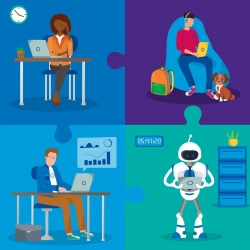To provide the best experiences, we use technologies like cookies to store and/or access device information. Consenting to these technologies will allow us to process data such as browsing behaviour or unique IDs on this site. Not consenting or withdrawing consent, may adversely affect certain features and functions.
The technical storage or access is strictly necessary for the legitimate purpose of enabling the use of a specific service explicitly requested by the subscriber or user, or for the sole purpose of carrying out the transmission of a communication over an electronic communications network.
The technical storage or access is necessary for the legitimate purpose of storing preferences that are not requested by the subscriber or user.
The technical storage or access that is used exclusively for statistical purposes.
The technical storage or access that is used exclusively for anonymous statistical purposes. Without a subpoena, voluntary compliance on the part of your Internet Service Provider, or additional records from a third party, information stored or retrieved for this purpose alone cannot usually be used to identify you.
The technical storage or access is required to create user profiles to send advertising, or to track the user on a website or across several websites for similar marketing purposes.
 A new survey commissioned by Tech.co claims that 68 percent of business leaders think it’s unethical for employees to use AI at work without the permission of a manager. The firms believes that the rise of generative AI tools has emphasised the need for complex ethical AI frameworks to govern its application in the workplace. Without these ethical frameworks, the technology risks threatening human roles and intellectual property in morally dubious and potentially harmful ways. More →
A new survey commissioned by Tech.co claims that 68 percent of business leaders think it’s unethical for employees to use AI at work without the permission of a manager. The firms believes that the rise of generative AI tools has emphasised the need for complex ethical AI frameworks to govern its application in the workplace. Without these ethical frameworks, the technology risks threatening human roles and intellectual property in morally dubious and potentially harmful ways. More →






































June 26, 2023
A balanced approach: making hybrid working work, and accepting it isn’t optional
by Mavis Boniface • Comment, Flexible working